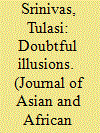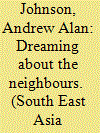|
|
|
Sort Order |
|
|
|
Items / Page
|
|
|
|
|
|
|
| Srl | Item |
| 1 |
ID:
153098


|
|
|
|
|
| Summary/Abstract |
This article examines the embattled intersection of magic and rationality in the transnational Sathya Sai movement and positions the magical materializations of the charismatic “godman” Sathya Sai Baba, and the sacred objects thus produced, within the neo-liberal economy. It then explores the tensions between the twin processes of magical production and rational debunking set against the framework of the discourse of nation building in contemporary India as it seeks to be and sustain a global power. The article illuminates the two conflicting discourses of materiality and rationality. It demonstrates that both are ethical subjectivities situated with regard to virtue—a “virtuous materiality” and a “virtuous rationality” —that together create a “critical politics of virtue”. The article concludes by tentatively suggesting that the critical politics of virtue can liberate current theory from a unitary understanding of ethical subjectivity in a neo-liberal world.
|
|
|
|
|
|
|
|
|
|
|
|
|
|
|
|
| 2 |
ID:
150559


|
|
|
|
|
| Summary/Abstract |
For Marcel Mauss (2001 [1902]), magic involves border-crossing, with powers founded upon the potentiality presented by the exotic and the unknown. In a similar vein, Webb Keane (2003) points to the movement of religious objects that, via their very materiality, acquire new meanings as they move between one “representational economy” and another. Here, I look at the consumption of Thai necromantic objects by Chinese Singaporean Buddhists. These are, in some cases, Thai body parts, ritually processed and sold via the international marketplace via Chinese Singaporean entrepreneurs and used for local business competition. I argue that, through this process, these objects become fused with Chinese religious notions of potency, Orientalist exoticization, and a fetishization of the entrepreneur. In doing so, these dreams about the neighbours complicate our understandings of cosmopolitanism, masculinity, and the vicissitudes of capitalism.
|
|
|
|
|
|
|
|
|
|
|
|
|
|
|
|
| 3 |
ID:
140507


|
|
|
|
|
| Summary/Abstract |
This article examines the moving image works of Chinese artist Cao Fei as a response to China’s rapid urbanization and the transformation of its existing urban spaces which are no longer shaped by socialism but instead by what this article considers as China’s engagement with neo-liberalism, including and facilitated by globalization. The urban sprawl of the Pearl River Delta inspired Rem Koolhaas’s writings on the ‘generic city’, which he celebrates precisely for its blandness. Cao herself is from Guangzhou. Yet, in works such as RMB City, Haze and Fog, Whose Utopia, and Hip Hop: Guangzhou, Cao creates what she calls ‘magical metropolises’. This article asks what kind of responses Cao’s ‘magical’ works are to contemporary Chinese urbanization. As part of the answer to this question, it applies four hermeneutic frameworks to analyse the works themselves. The findings from each of those frameworks indicate that Cao’s work not only reflects the current Chinese urban condition, but also participates and intervenes in it in various ways.
|
|
|
|
|
|
|
|
|
|
|
|
|
|
|
|
| 4 |
ID:
193264


|
|
|
|
|
| Summary/Abstract |
This World Affairs 2023 special issue contains six contributions, including this one, exploring some of the key political consequences of traditional beliefs such as magic and superstition in the developing societies of the Global South as well as in certain industrially advanced societies of the Global North. To show why traditional beliefs matter, we provide an explanation in this introduction for why traditional beliefs exist in developing countries, why they survive in developed countries, and why they may become more popular over time. By utilizing a simple game theoretic approach, we explain why rational people can sometimes increase their payoffs by subscribing to a superstition while superstitious people never gain by switching to rationality. In fact, the superstition—which has no causal connection with the natural course of events—may even yield better results, not only for the individual but also for the group. This is the reason why, in the framework of evolutionary stable equilibrium, superstitious people can demographically dominate an entire population over time. In addition to explaining the existence and the persistence (or the popularity) of traditional beliefs, we highlight the key findings presented in the articles included in this special issue. All of them underline a cardinal point: traditional beliefs matter. They shape electoral behavior, they shape attitudes toward democratic governance, and they influence voters’ assessment of political figures and historical events. Precisely because traditional beliefs have such extensive implications for a country's political life, we believe that in the future scholars will have to pay greater attention to such beliefs to have a better understanding of political phenomena and trends.
|
|
|
|
|
|
|
|
|
|
|
|
|
|
|
|
| 5 |
ID:
141081


|
|
|
|
|
| Summary/Abstract |
This article inquires into the cultural and political nexus of secular (stage) magic, modernity, and Orientalism at the turn of the twentieth century. It argues that these three arenas interacted in important and special ways to both shape and reflect the politics of knowledge of the period. In doing so, it draws attention to the ways in which secular magic has been overlooked as a historical phenomenon and highlights its utility in furthering our understanding of the great problematics of modernity and Orientalism; in particular, it suggests that magic actually provides an unusually vibrant and clear lens through which to view the politics of the Other and through which to explore issues of tradition and the modern. Focusing on two historical cases—the ‘Indian Rope Trick’ challenge issued by the Magic Circle in the 1930s and the astonishing ‘duel’ between the ‘Chinese’ magicians Chung Ling Soo and Ching Ling Foo in 1905—this article considers the ways in which discourses of origination, popular ideas about esotericism and the ‘mystic East’, and questions of technical competence interacted and competed in the culture politics of the early twentieth century.
|
|
|
|
|
|
|
|
|
|
|
|
|
|
|
|
| 6 |
ID:
084920


|
|
|
|
|
|
|
|